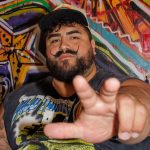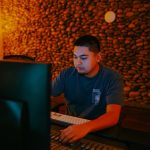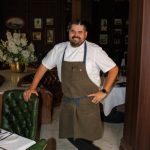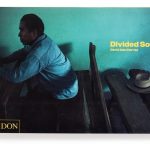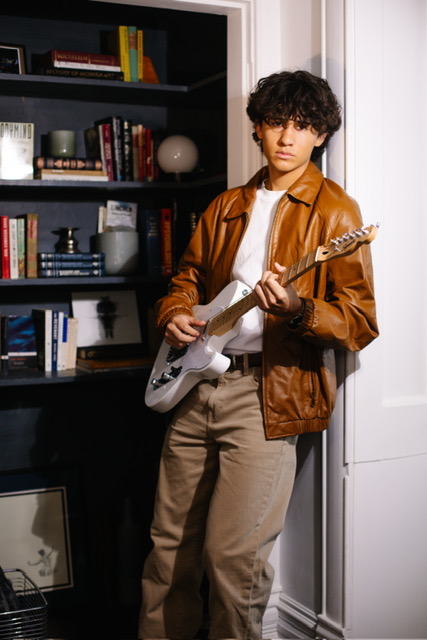
Written by
Melody Stout
Editorial Photography by
Annabella Mireles
Editorial Photography location
The Sanctum
Men are often expected to embody stoicism, keeping their emotions locked away and never expressing them publicly. This stigma has led to years of trauma dealt with in silence for many young men, especially those in Latino communities.
This was true for young El Paso musician Julian Kalel.
His battle with anxiety and depression set future events into motion that would change the way he was living life. He began a journey of making music to heal himself while also using his platform to advocate for young men struggling with mental health. Julian spoke candidly about his struggles with depression and anxiety and how his inability to express and deal with those emotions placed him in a very dangerous situation.
Last summer, while driving down Mesa Street, Julian was involved in a head-on collision. He was physically focused on driving but mentally battling everything running through his head.
“‘I guess I’m just going to be like this. This is my life. I’m not going to talk to people about it, I’m not going to express myself. I’m just going to be a guy with a thundercloud over his head for the rest of his life,’” Julian said of his mindset at the time.
Thankfully, no injuries occurred in the crash, but something shifted within Julian.
Following a spiral of self-deprecation immediately after the accident, he realized he was given a second chance at life and was meant to begin a new chapter.
Before the accident, he was very caught up in others’ perceptions of him. Afterward, he finally felt free to live the way he wanted, using music as his outlet.
“I went home and set up my phone, got my guitar, and started playing,” he said. “I started posting covers and was very surprised by the positive feedback people were giving.”
Fueled by the encouragement from social media and a newfound sense of inspiration, Julian decided to write a song.
“I was amazed at how easily it came to me. Just describing that night, putting it into words, but that’s what happened with my first EP, called ‘A Second Chance,’” he said.
Following his accident, Julian wrote his first three songs, featured on the EP: “First Time,” “Pyrite,” and “Julian’s Song,” which can be found on Spotify.
“The one that stuck with me the most was ‘First Time,’” he said. “It’s a song about
being patient with yourself, remembering that it’s only your first time experiencing life, and disappointments happen. All those challenges you go through are a part of life – of living – and you need to embrace that.”
This life-changing event proved exactly what Julian needed to dive into music.
Now, he was focused on living with an ‘I’m going to do what I want to do’ mentality. He’s not pursuing fame or money, but rather the opportunity to share his experiences and reach people who feel the same way he did.
Music wasn’t an entirely new concept for Julian.
Growing up doing musical theater and learning to play various instruments from a young age, he has been surrounded by it for a long time.
“I’ve been around music practically my entire life. I’ve been singing since I was able to talk. I would sing my favorite Disney songs to my mom and grandparents,” he shared.
With encouragement from his family, he tried many instruments growing up, like the violin and cello, before landing on the guitar, which he has since used to write all his songs.
“I really, really, loved it. I consider myself a campfire guitarist, meaning I can play popular songs that people know and can sing along. It was a personal experience, just me and my guitar.”
As many homegrown musicians do, Julian started making music with his friends in their bedrooms around the eighth grade using a makeshift recording setup. He began producing instrumentals by playing with the structure of songs, understanding how they come together and what it takes to make a decent-sounding piece of music.
He’s come a long way since first messing around with melodies. Now he’s built a platform, using songs to express the emotions he grew up trying to ignore, hoping to break the stigma around men’s mental health.
His philanthropic efforts don’t stop with mental health and are not limited to the Southwest, and extend to the Country Music capital. This past February, Julian made his Nashville debut performing a benefit concert for the Nashville Foster Love Closet.
Performing in Nashville was an unreal blessing for Julian, given that he draws his sound from various country artists like Zach Bryan, Tyler Childers, and Dylan Gossett, hones in on a very emotional and gritty sound to his music.
“Nashville is an amazing city and everyone I met was very kind and very welcoming. It’s an inspiring and empowering city to perform,” he shared.
His most memorable performance to date was a concert at the Star City Studios benefitting NAMI El Paso, a mental health organization dedicated to improving the lives of individuals and families affected by mental illness.
Not only was it a cause very close to Julian’s heart, but the location brought about a full-circle moment for the artist: Star City Studios is located at the exact intersection of the fateful accident that kickstarted his songwriting and performing career.
“My dad brought it to my attention and reminded me, ‘You do realize that was the intersection where you had your truck accident, and now, one year later, look at where you are now, on stage at a studio located at that same intersection,’” Julian said. “After that accident, I wanted to be a better person than I was at that moment. I wanted to leave that version of Julian behind.”
In the year following his accident, Julian has undergone a drastic transformation, from a struggling teen who thought his life was destined to be dark and not wanting to talk about his struggles, to being very open about sharing his experiences with others to start a conversation about mental health.
“That is one of my main motives for making music. I want to get rid of that stigma,” Julian said. “So many kids my age, especially boys, see talking about your mental health struggles as weak. It makes you vulnerable. We’re told ‘You’ve got to keep that to yourself, keep it inside, you can’t share that.’”
This sentiment is a difficult one to overcome, but it starts with getting that idea out of young men’s minds and building the new idea that talking about mental health, especially for men, shouldn’t be taboo.
Looking to the future, Julian is getting ready to release a single that he recorded in Nashville with the help of Ian Miller, owner of Roasted Bean Studio.
“I think these are the best songs, works of art that I’ve ever made. It wasn’t only me, it was with the help of all those amazing musicians, including my sister, Karyssa. For the first time, it doesn’t sound like music that a kid put together in his bedroom,” Julian said.
The upcoming release will feature the song “Surrender,” which he deemed the most personal song he’s ever made. His sister even made a musical accompaniment to the song by playing violin.
“It’s like when you are at your lowest and you feel like there’s nothing else out there for you. All these things are freaking you out, all these worries occupying your mind,” Julian said. “But the lesson there is, you just have to let that all go and surrender yourself to God and let the universe take its course.”
Julian is using his platform to connect to people in live performance settings, achieving a goal he didn’t even realize he had.
“Growing up, I thought I could someday be an astronaut or a doctor or a lawyer, but in the back of my mind, my dream was to be on the stage, reaching out to people, connecting with them, and their trials and tribulations,” Julian said.
His website promotes mental health resources for parents and those who need them. He also takes requests for covers of songs that comfort people and have helped them through tough times.
Using music as medicine for his mind, Julian is also helping others vocalize their struggles and learn it’s okay to deal with your emotions.
“When you have all these ideas, thoughts, and emotions running through your mind, sometimes you feel like it’s impossible to express them in words, but music is what gets the message through for me.”





